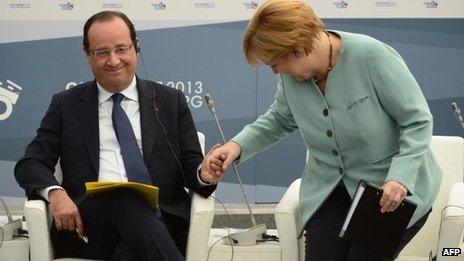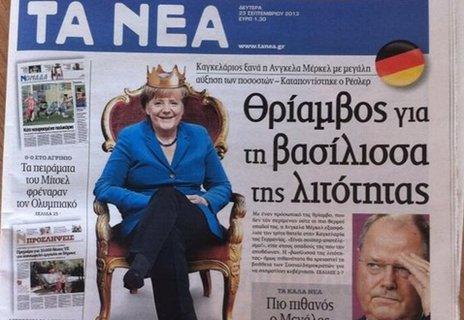German election: What Merkel's peers really think
- Published

Francois Hollande and Angela Merkel (file picture)
Angela Merkel has been the pre-eminent politician in European politics in recent times and, after her election victory, will remain so.
That may cause mixed feelings in other European capitals, which perhaps appreciate the continuity but are hoping for a bit more sympathy from Berlin.
Our correspondents in some of Europe's key capitals round up the reaction there.
FRANCE, by Christian Fraser in Paris
French President Francois Hollande, a Socialist, was quick to congratulate Angela Merkel on her victory, but privately the prospect of a grand coalition with the SPD will be welcomed in the Elysee Palace.
The SPD is seen as the most "pro-European" of the German parties. It has attacked the German chancellor for over-reliance on austerity and has toyed with the idea of "eurobonds" - jointly issued debt - an idea that the French support.
But does the result have any wider implications for the Socialists in France?
This weekend, as Angela Merkel received her resounding endorsement from the German electorate, Francois Hollande saw his figures sink to an all-time low - down five points to just 23%, according to one poll.
Improved second quarter figures cannot mask wider problems in the French economy, where unemployment is at a record high, and growth is anaemic.
In France the right-wing UMP said the German result was a lesson to the ailing French president.
"The Germans recognise that only structural reform will bring economic prosperity," said the UMP leader Jean-Francois Cope. "The SPD advocated a tax hike and it was badly beaten."
BRITAIN, by Naomi Grimley in London
"I'm looking forward to continuing to work closely with her." So tweeted David Cameron on the news that the world's most powerful woman had been returned to office.
Mr Cameron and Angela Merkel have struck up a warm relationship since he became prime minister in 2010. But there are other reasons for him to be happy.
First, the results suggest that governing conservative parties can improve their performance even in the middle of an economic crisis.
Secondly, Mr Cameron hopes his German counterpart will be a useful ally in his bid to claw back some powers from the EU. He wants to do this so that more British voters might be persuaded to vote Yes in a referendum on the UK's continued membership in 2017.
Originally, Mrs Merkel was rather sceptical about this. But it is thought she is now more sympathetic to the idea of returning some powers from the EU Commission to national capitals - especially if cutting red tape helps boost economic growth.
It remains to be seen whether the Social Democrats, if they take part in a grand coalition, have any influence that changes this calculation.
GREECE, by Mark Lowen in Athens
The phone call, we are told, was warm: Greece's Prime Minister Antonis Samaras offering heartfelt congratulations to Angela Merkel.
But, away from the smiles, he knows there will be no let-up from Berlin's tough policy here. The centre-left daily Ta Nea says it all: a mocked-up picture of Angela Merkel in a crown, perched on a throne beside the headline: "Triumph for the Queen of Austerity."

Mrs Merkel's victory will please few here. She is perceived as the driving force behind budget cuts that have sent unemployment to 28% and poverty levels to one in five. According to the polls, 79% of Greeks have a negative view of her.
The focus here now will shift to a funding gap of around 10bn euros (£8.5bn) next year. The Greek government argues the country cannot take any more cuts, and that interest rates on its loans should be lowered or the repayment period extended. It will hope that the "Queen of austerity" might lend a more sympathetic ear this time.
ITALY, by Alan Johnston in Rome
Italy's Prime Minister Enrico Letta was quick to offer Angela Merkel his congratulations on her victory.
He is profoundly pro-European, and was obviously relieved that the Eurosceptic party, Alternative fuer Deutschland, had not managed to get into parliament.
Mr Letta said this was "a sign of Germany's European conviction. And we will work together."
Above all, the election result has delivered a sense of continuity here.
As one observer put it: "Italians have learnt how to deal with Mrs Merkel, and interpret the signals she sends."
But often they have not much appreciated her message, with its emphasis on the need for austerity to tackle the eurozone's troubles.
And Prime Minister Letta has pressed hard for EU policies that would stimulate growth and job creation.
He may well hope that the leftist Social Democrats get drawn into a new German coalition - and that perhaps they will help soften the chancellor's line.